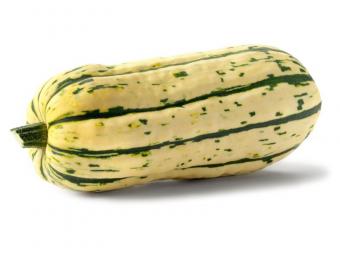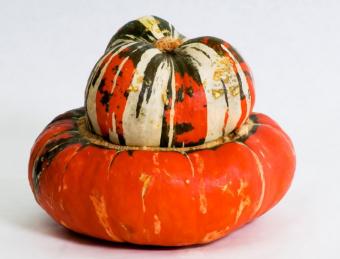A Wide Variety

Acorn Squash

Buttercup Squash

Hokkaido Squash

Butternut Squash

Sweet Dumpling Squash

Delicata Squash

Kobacha Squash

Turban Squash

© 2024 LoveToKnow Media. All rights reserved.

Learning a little bit about winter squash identification will help you choose fun new varieties to liven up your vegetable garden.
Their tough outer skin and lengthy shelf life distinguish winter squash, such as the varieties seen here, from summer squash like zucchini or vegetable marrow.
Although the pumpkin is the most commonly recognized variety, several other cultivars outperform the pumpkin both in appearance and in taste.

The acorn squash is a cute little green squash with an easily recognizable acorn shape. Acorn squash is both easy to grow and highly nutritious.

The buttercup squash is a short, round green squash with streaks of gray running from the stem to the blossom end. Despite its outwardly bland appearance, the buttercup squash is one of the most dark-fleshed, and therefore most nutritious, winter squash varieties.

Originating in northern Japan, Hokkaido squash is prized for its pleasant taste. Even if you don't care for pumpkin, you might enjoy this squash in soups, pies or casseroles. If you do like pumpkin, you will love Hokkaido squash.

With a smooth, buff-colored outer rind and distinctive gourd-like shape, the butternut squash is easily recognizable. Butternut squash tastes similar to pumpkin but has a smoother texture. This squash makes an excellent pumpkin alternative for both sweet and savory dishes.

The Sweet Dumpling Squash is not just a pretty face - it is also easy to grow, easy to store, and easy to cook. The petite vine will yield up to ten specimens per plant, allowing enough squash to take care of your cooking needs and to make a few novelty Jack o' lanterns as well.

The flavor of the oblong delicata squash is half pumpkin and half sweet potato, earning it the nickname sweet potato squash. Sliced lengthwise, stuffed and baked, the delicata squash is delicious as a side dish with pork chops or as a vegetarian main course.

Sweet, dense and starchy, this Japanese import is gaining popularity in North American markets. This variety needs a long growing season and a lot of garden space, but is one of the tastiest and most nutritious varieties you can grow.

For this particular winter squash, identification is easy. With its unusual shape and bright coloration, the turban squash is hard to miss. The flesh is dry, dense and slightly nutty. Like the kobacha, these squash plants need a lot of time and space, but are well worth it.

Learning more about winter squash identification will help you add a whole new dimension to your garden. Try planting a few unusual squash plants in your next vegetable garden, and find out just how good a little variety can taste.